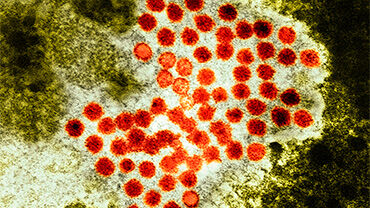Staying healthy during Pride season: practice safer sex and check vaccination status
Dutch health authorities have recently reported an increase of hepatitis A infections particularly affecting men who have sex with men. With the on-going Pride events across Europe, ECDC stresses the importance of ensuring hepatitis A vaccination, (advice for) safer sex and personal hygiene practices including washing hands and genital areas before and after sex to avoid infection.

Between 2016 and 2018, several EU/EEA countries experienced a large outbreak of hepatitis A infections mainly affecting men who have sex with men (MSM). In light of a recently reported increase of hepatitis A infections mainly among MSM in the Netherlands and the on-going Pride season, ECDC renews the main recommendations stated in its 2017 risk assessment addressing the hepatitis A outbreak and from the ECDC guidance on HIV and STI prevention among MSM:
- Travellers to Pride events should ensure their routine vaccination courses (including against hepatitis A) and boosters are up to date as recommended in their country of residence, and discuss the need for additional vaccinations or booster doses with their healthcare provider.
- Pride participants should receive advice on prevention of sexually transmitted infections (STI) prior to attendance including recommendations on HIV pre-exposure prophylaxis (PrEP).
- The use of dental dams for oral-anal sex and of latex gloves during fingering or fisting may offer some protection against hepatitis A (HAV). The use of condoms for anal sex may also offer protection against other STIs.
- Upon return: testing for sexually transmitted infections (including HIV and hepatitis) and healthcare provider evaluation among those experiencing symptoms or those who engaged in unprotected sexual activity with casual partners is advised.
- All men who have sex with men diagnosed with hepatitis A should be referred to sexual health services for further STI/HIV testing. Known partners of those diagnosed should be notified and offered testing and treatment.
An ECDC systematic review on hepatitis A endemicity and overall population susceptibility in the EU/EEA showed that most EU countries have low or very low HAV endemicity and that a growing proportion of EU and EEA residents are susceptible to HAV infection. MSM are a group at increased risk for HAV infection in settings with low and very low endemicity of hepatitis A, and most EU countries recommend hepatitis A vaccination for them.
Hepatitis A is an acute, usually self-limiting, infection caused by the hepatitis A virus. HAV is predominantly transmitted via the faecal-oral route, through contaminated water or food products and/or by person-to-person contact. Transmission through sexual exposure has been associated with outbreaks in MSM, and transmission through the sharing of needles and syringes with outbreaks among people who inject drugs.







